英语人教版九年级下册(重庆专版)课件 Unit 12 Life is full of the unexpected.(42张PPT)
文档属性
| 名称 | 英语人教版九年级下册(重庆专版)课件 Unit 12 Life is full of the unexpected.(42张PPT) |
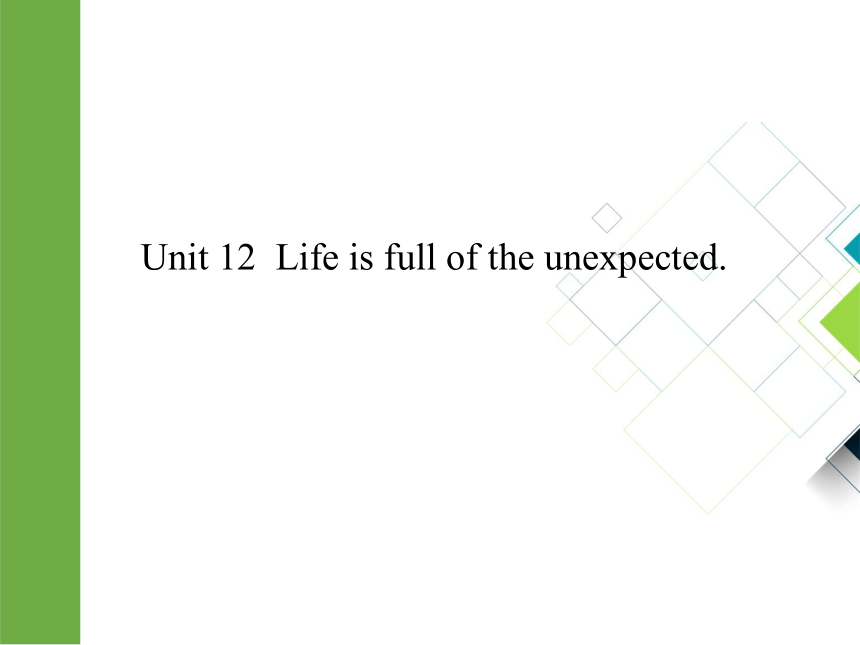
|
|
| 格式 | zip | ||
| 文件大小 | 318.7KB | ||
| 资源类型 | 教案 | ||
| 版本资源 | 人教新目标(Go for it)版 | ||
| 科目 | 英语 | ||
| 更新时间 | 2019-11-11 00:00:00 | ||
图片预览

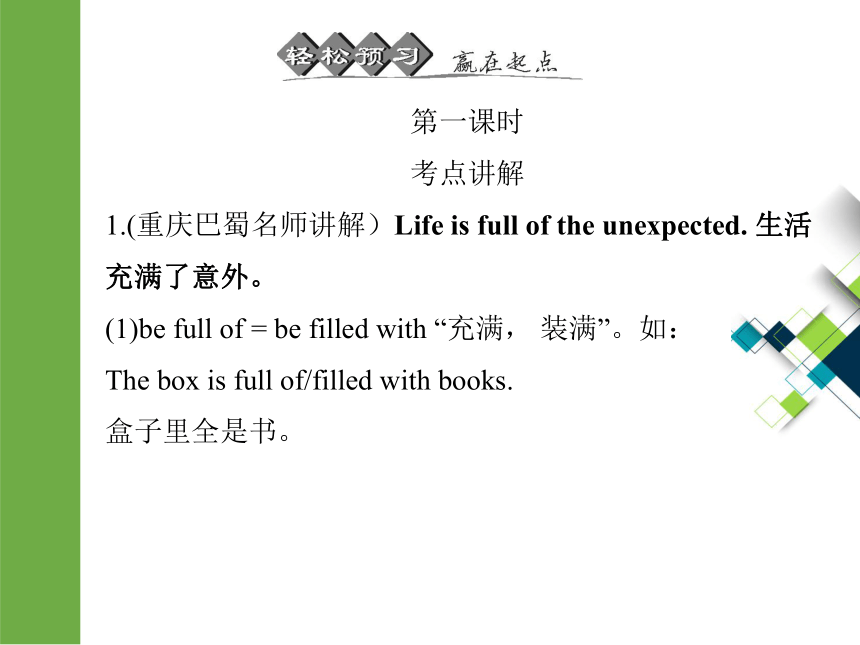
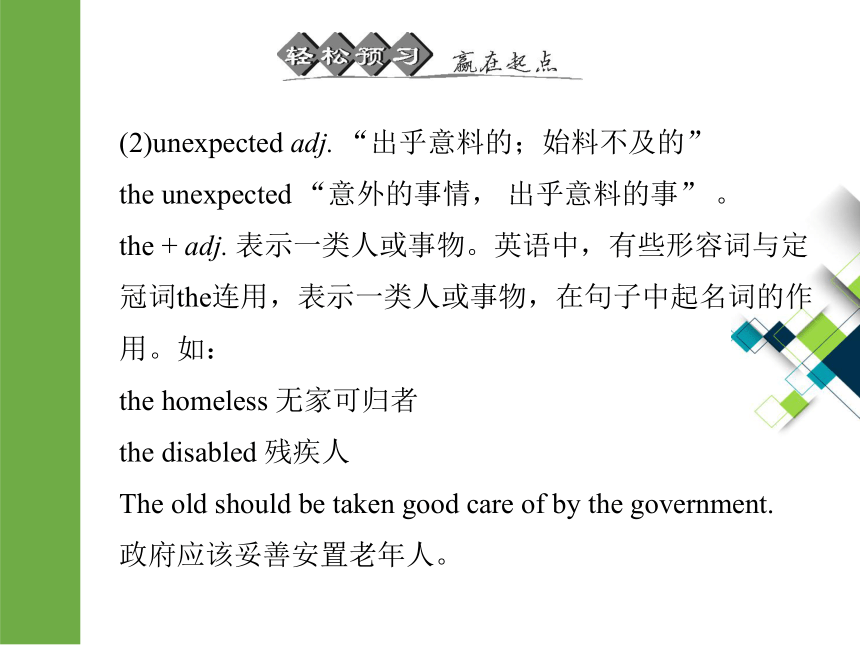
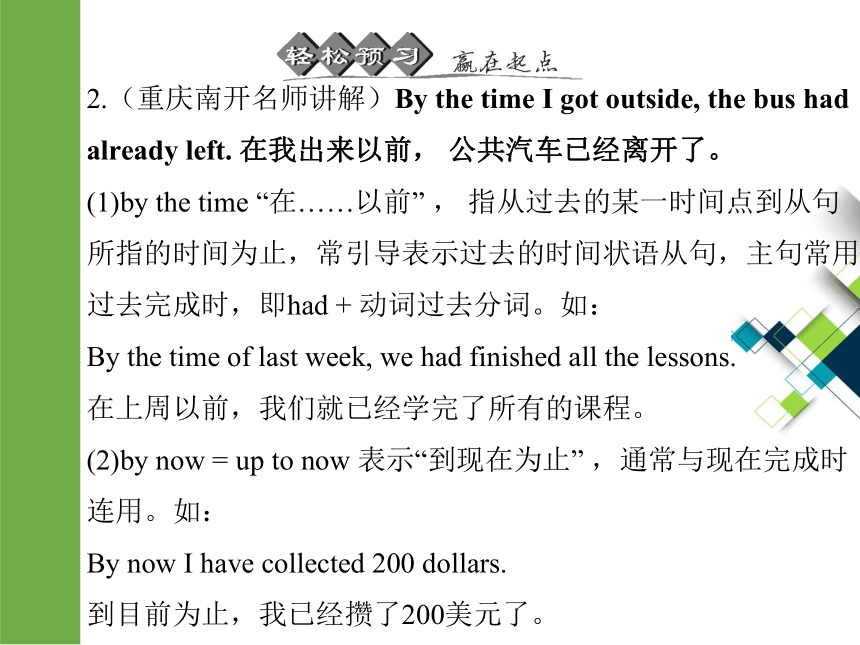
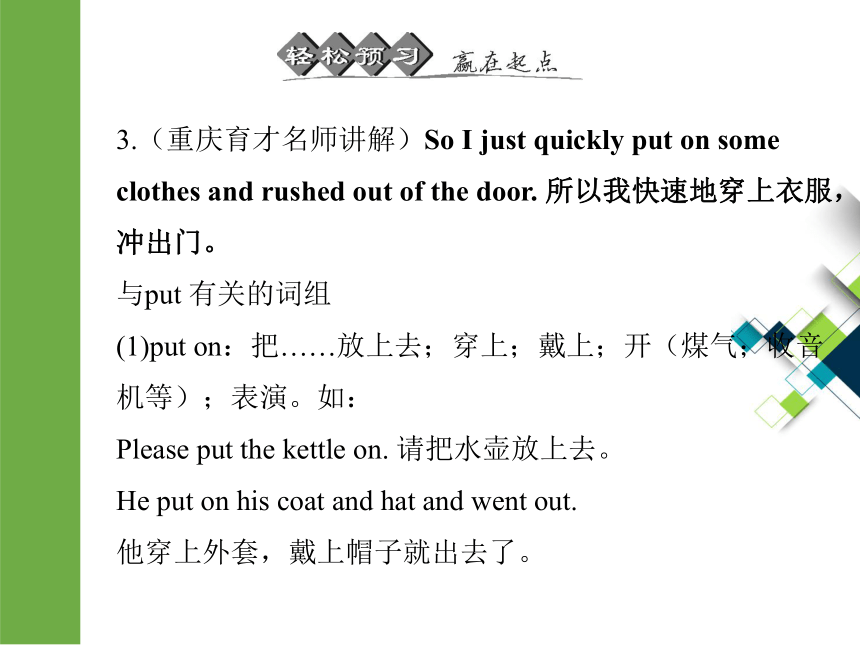
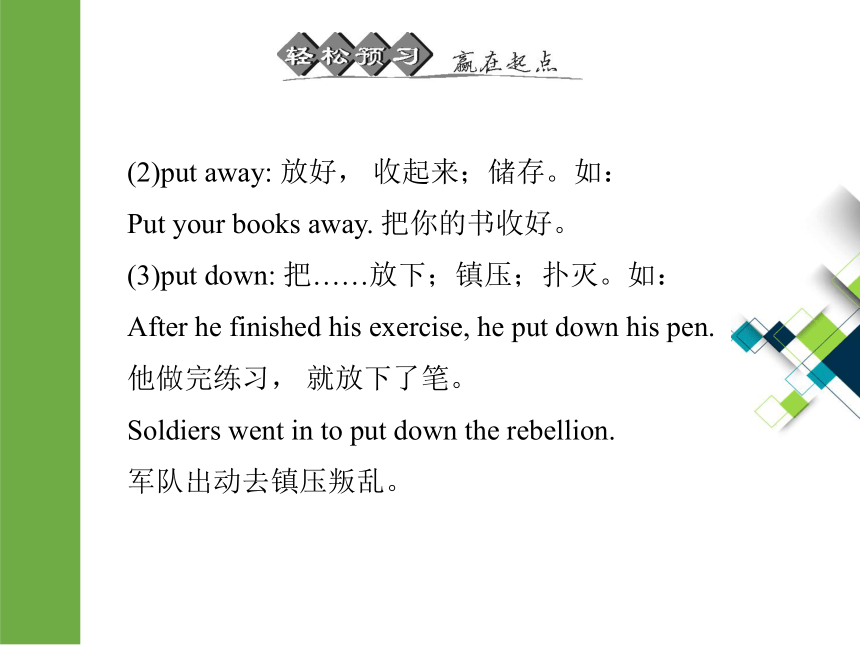
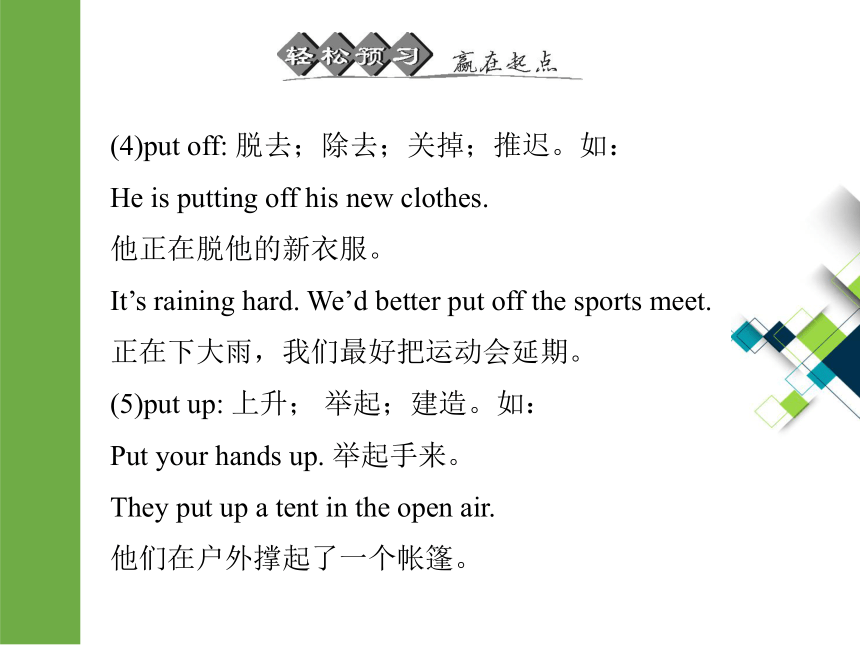
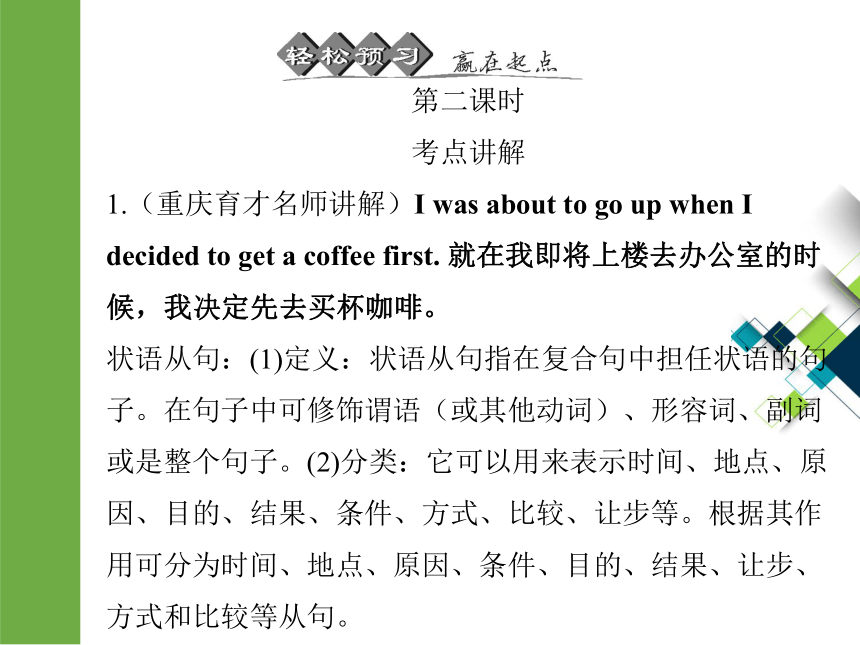
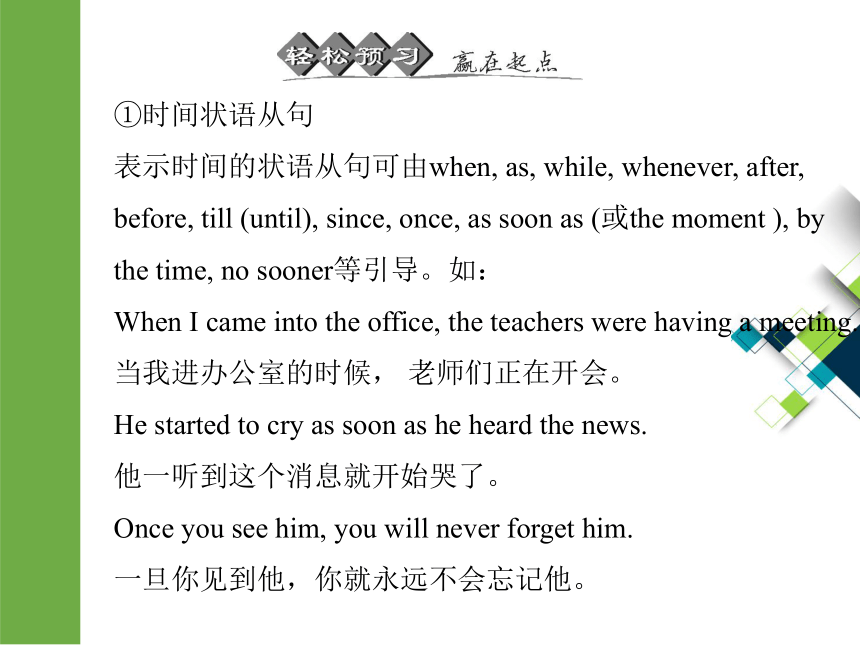
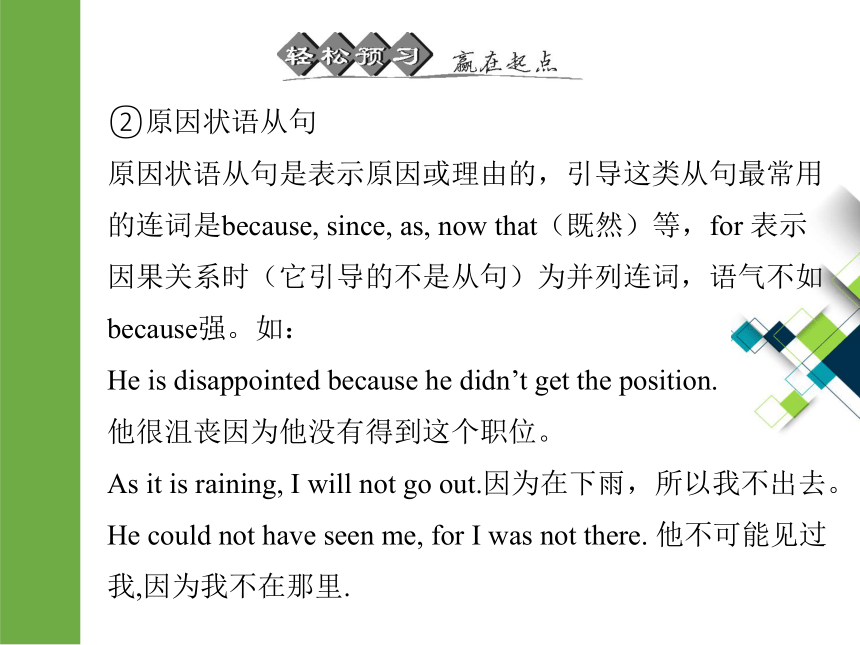
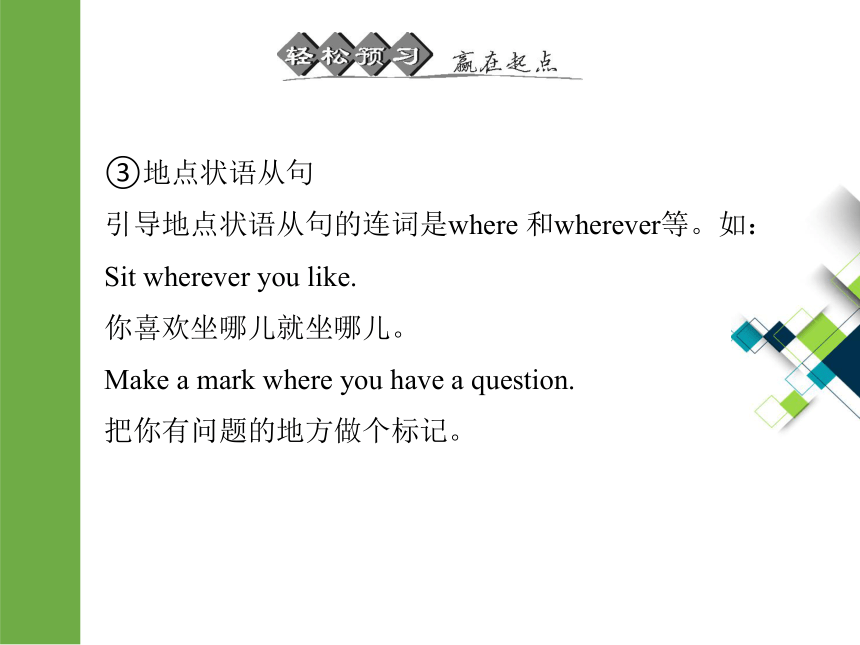
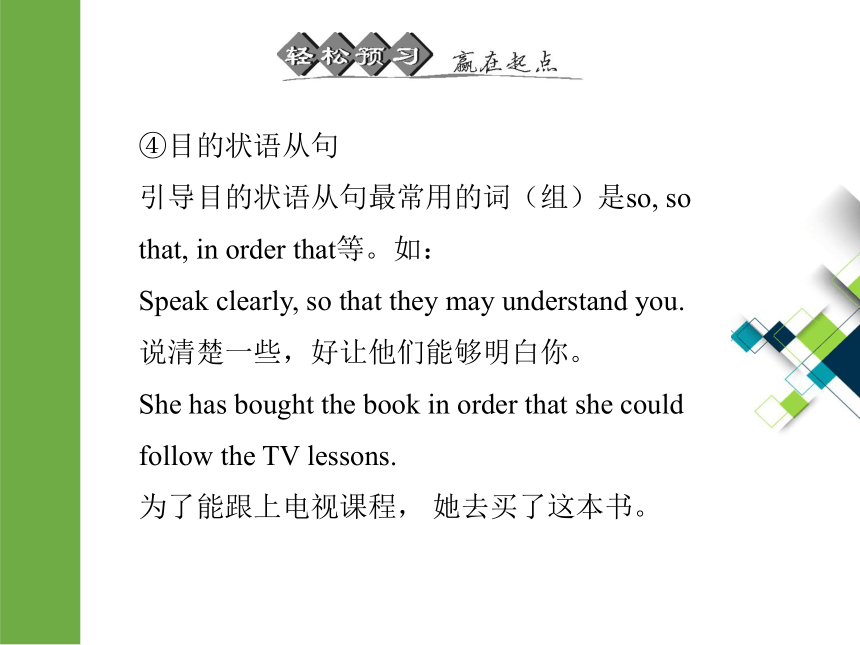
文档简介
课件42张PPT。 Unit 12 Life is full of the unexpected.第一课时
考点讲解
1.(重庆巴蜀名师讲解)Life is full of the unexpected. 生活充满了意外。
(1)be full of = be filled with “充满, 装满”。如:
The box is full of/filled with books.
盒子里全是书。(2)unexpected adj. “出乎意料的;始料不及的”
the unexpected “意外的事情, 出乎意料的事” 。
the + adj. 表示一类人或事物。英语中,有些形容词与定冠词the连用,表示一类人或事物,在句子中起名词的作用。如:
the homeless 无家可归者
the disabled 残疾人
The old should be taken good care of by the government.
政府应该妥善安置老年人。2.(重庆南开名师讲解)By the time I got outside, the bus had already left. 在我出来以前, 公共汽车已经离开了。
(1)by the time “在……以前” , 指从过去的某一时间点到从句所指的时间为止,常引导表示过去的时间状语从句,主句常用过去完成时,即had + 动词过去分词。如:
By the time of last week, we had finished all the lessons.
在上周以前,我们就已经学完了所有的课程。
(2)by now = up to now 表示“到现在为止” ,通常与现在完成时连用。如:
By now I have collected 200 dollars.
到目前为止,我已经攒了200美元了。3.(重庆育才名师讲解)So I just quickly put on some clothes and rushed out of the door. 所以我快速地穿上衣服, 冲出门。
与put 有关的词组
(1)put on:把……放上去;穿上;戴上;开(煤气;收音机等);表演。如:
Please put the kettle on. 请把水壶放上去。
He put on his coat and hat and went out.
他穿上外套,戴上帽子就出去了。(2)put away: 放好, 收起来;储存。如:
Put your books away. 把你的书收好。
(3)put down: 把……放下;镇压;扑灭。如:
After he finished his exercise, he put down his pen.
他做完练习, 就放下了笔。
Soldiers went in to put down the rebellion.
军队出动去镇压叛乱。(4)put off: 脱去;除去;关掉;推迟。如:
He is putting off his new clothes.
他正在脱他的新衣服。
It’s raining hard. We’d better put off the sports meet.
正在下大雨,我们最好把运动会延期。
(5)put up: 上升; 举起;建造。如:
Put your hands up. 举起手来。
They put up a tent in the open air.
他们在户外撑起了一个帐篷。第二课时
考点讲解
1.(重庆育才名师讲解)I was about to go up when I decided to get a coffee first. 就在我即将上楼去办公室的时候,我决定先去买杯咖啡。
状语从句:(1)定义:状语从句指在复合句中担任状语的句子。在句子中可修饰谓语(或其他动词)、形容词、副词或是整个句子。(2)分类:它可以用来表示时间、地点、原因、目的、结果、条件、方式、比较、让步等。根据其作用可分为时间、地点、原因、条件、目的、结果、让步、方式和比较等从句。
①时间状语从句
表示时间的状语从句可由when, as, while, whenever, after, before, till (until), since, once, as soon as (或the moment ), by the time, no sooner等引导。如:
When I came into the office, the teachers were having a meeting.
当我进办公室的时候, 老师们正在开会。
He started to cry as soon as he heard the news.
他一听到这个消息就开始哭了。
Once you see him, you will never forget him.
一旦你见到他,你就永远不会忘记他。②原因状语从句
原因状语从句是表示原因或理由的,引导这类从句最常用的连词是because, since, as, now that(既然)等,for 表示因果关系时(它引导的不是从句)为并列连词,语气不如because强。如:
He is disappointed because he didn’t get the position.
他很沮丧因为他没有得到这个职位。
As it is raining, I will not go out.因为在下雨,所以我不出去。
He could not have seen me, for I was not there. 他不可能见过我,因为我不在那里.③地点状语从句
引导地点状语从句的连词是where 和wherever等。如:
Sit wherever you like.
你喜欢坐哪儿就坐哪儿。
Make a mark where you have a question.
把你有问题的地方做个标记。④目的状语从句
引导目的状语从句最常用的词(组)是so, so that, in order that等。如:
Speak clearly, so that they may understand you.
说清楚一些,好让他们能够明白你。
She has bought the book in order that she could follow the TV lessons.
为了能跟上电视课程, 她去买了这本书。⑤结果状语从句
结果状语从句是表示事态结果的从句,通常主句是原因,从句是结果。由so...that..., so that, such that等引导。如:
She was ill, so that she didn’t attend the meeting.
她病了所以她没参加这个会议。
He was so excited that he could not say a word.
他激动得说不出话来。⑥条件状语从句
条件状语从句分真实性(有可能实现的事情)与非真实性(条件与事实相反或者在说话者看来不大可能实现的事情)条件句。引导条件状语从句的词(组)主要有if, unless, so (as) long as, so (as) far as, if only ( = if )。
注意:条件状语从句中的if 不能用whether替换。如:
If he is not in the office, he must be out for lunch.
如果他不在办公室, 那他一定出去吃午饭了。
You may borrow the book so long as you keep it clean.
你可以借走这本书只要你能保持它干净。⑦让步状语从句
让步状语从句可由although, though, even if (though), however, whatever 等引导。如:
Though he is a child, he knows a lot.
尽管他是个小孩, 他知道的却很多。⑧比较状语从句
比较状语从句常用than, so (as)... as, the more...the more...等引导。如:
I have made a lot more mistakes than you have.
我犯的错误比你多。
He doesn’t study as hard as his brother.
他并没有像他哥哥一样努力学习。(3)使用状语从句时要注意的几个问题
①在时间和条件从句中,主句是一般将来时,从句通常用一般现在时表示将来(主将从现)。如:
We’ll go out if it doesn’t rain tomorrow.
如果明天不下雨,我们就出去。
I’ll write to you as soon as I get to Shanghai.
我一到上海就写信给你。②注意区分不同从句:引导的是什么从句,不仅要根据连词,还要根据句子结构和句意来判别。以where为例,能引导多种从句。
You are to find it where you left it.(地点状语从句,句中没有先行词)你在哪儿丢的它,就去哪儿找。
Tell me the address where he lives.(定语从句,句中有先行词)告诉我他的住址。
I don’t know where he came from.(宾语从句)
我不知道他来自哪里。
Where he has gone is not known yet.(主语从句)
他去哪儿了到现在都不知道。2.(重庆一中名师讲解)Before I could join the others outside to see what was going on, the first plane had already hit my office building. 在我和其他外面的人还来不及看发生了什么事情之前, 第一架飞机已经撞上了我办公室的大楼。
过去完成时
(1)概念:过去完成时表示在过去某一时间或动作之前已经发生或完成了的动作,即“过去的过去”。(2)结构:had + done(had 通用于任何人称)
She had finished writing the composition by 10:00 this morning.
到今天上午十点钟, 她已经完成了作曲。
They had already had breakfast before they arrived at the hotel. 在到达酒店前, 他们就已经吃了早饭。(3)用法:
①表示一个动作或状态在过去某一时间或动作之前已经完成或结束,即发生在“过去的过去”。如:
When I woke up, it had stopped raining. 我醒来时, 雨已经停了。(主句的动作发生在“过去的过去”)
②表示由过去的某一时刻开始,一直延续到过去另一时间的动作或状态,常和for, since构成的时间状语连用。如:
I had studied English for three years before coming to this school. 在来这所学校之前,我已经学习了三年的英语。③用来表示未曾实现的愿望或打算。
动词hope, wish, plan, want, mean, intend 等表示“打算,计划, 希望, 认为”时,用于过去完成时表示“本打算、本计划、本希望做而未做”。如:
I had hoped to be back last night, but I didn’t catch the train.
我本希望昨晚回来的,可我没赶上火车。(4)过去完成时与现在完成时的区别
现在完成时表示的动作发生在过去,但侧重对现在产生的结果或造成的影响, 与现在有关,其结构为“助动词 have (has) + 过去分词”;过去完成时则是一个相对的时态,它所表示的动作不仅发生在过去, 更强调“过去的过去”,只有和过去某时或某动作相比较时,才用到它。如:
I have learned 1,000 English words so far.
到目前为止我已经学会了 1000 个英语单词。
I had learned 1,000 English words till then.
到那时为止我已经学会了 1000 个英语单词。
—I’m sorry to keep you waiting. 对不起,让你久等了。
—Oh, not at all. I have been here only a few minutes. 没什么,我只等了几分钟。(“等”的动作从过去某一时间点持续到现在)
—John returned home yesterday. 约翰昨天回到家的。
—Where had he been? 他去哪儿了?(答语中使用过去完成时是指约翰在 returned home 之前去了哪些地方,即“过去的过去”。)3.(重庆八中名师讲解)We stared in disbelief at the black smoke rising above the burning building. 我们难以置信地盯着燃烧着的大楼上升起的黑烟。
(1)above为介词,表示“在……上方”,说明物体间的上下位置关系,不触及表面,也不表示垂直关系,与below相反。如:
The waterfall is above the bridge. 瀑布在桥的上方。(2)辨析above, on与over
① above表示位置时指“在……上方”,不一定垂直,也不与其宾语接触。above的反义词是below。如:
The temperature crept up to just above 40 degrees.
温度攀升至40度出头。
② on通常指“在……上面”,强调两个物体相接触。其反义词是beneath。如:
There is a car on the bridge. 桥上有一辆汽车。
③ over通常指“正对……的上方”,强调两个物体之间相互垂直。over的反义词是under。如:
There is a bridge over the river. 河上有一座桥。第三课时
考点讲解
1.(重庆南开名师讲解)The lady was so happy because she really wanted to get married. 这位女士很高兴,因为她真的很想结婚。
marry sb. “嫁给某人, 与某人结婚”。如:
He wanted to marry Helen, but she married someone else.
他想和海伦结婚,但是她嫁给了别人。
get married (to sb. ) 表示“与某人结婚”。 如:
She got married to a teacher. 她和一位教师结了婚。marry sb. to sb. “(父母把女儿)嫁给某人、(父母为儿子)娶媳妇”。如:
She married her daughter to a good-tempered man.
她把女儿嫁给了一个好脾气的人。
He married his son to a good woman.
他为儿子娶了一个好媳妇。
注意:延续性动词为 be married, 如:
He got married 10 years ago. = He has been married for 10 years.
他十年前结的婚。/他已经结婚十年了。2.(重庆八中名师讲解)However, when she said yes, he replied, “April Fool!”. 然而,当她说出“我愿意”时, 他回答:“愚人节傻帽儿!”
(1)however 为副词,意为“然而;可是”,表示转折,在句中的位置比较灵活,可置于句首、句中或句末,通常用逗号隔开。如:
It’s raining hard. However, I still want to go there.
天下着大雨。然而,我还是想去那儿。(2)辨析however与but
两者都表示“然而;但是”,且都可连接并列句。
①从语义上看, but 所表示的是非常明显的对比, 转折的意味比however要强。
②从语法上看, but是个并列连词,而however却是个副词。
③从语序上看, but总是位于所引出的分句之首,而however却可位于句首、句中和句末。
④从标点符号上看, but之后一般不用逗号,而however连接两个分句时,用逗号隔开。如:
I feel a bit tired. However, I can hold on.
我感到有点累了,但我能坚持下去。
The watch is cheap, but it goes quite well.
这块手表虽然便宜,但它还是走得很准。
He said that it was so. He was mistaken, however.
他说事情是这样的,然而他错了。第四课时
考点讲解
1.(重庆育才名师讲解)Why did the supermarkets run out of spaghetti one April Fool’s Day?
为什么超市里的意大利面在一个愚人节卖光了?
含有out 的动词短语
break out(战争等)爆发;使逃脱,使逃走
bring out使……显示出来;出版
carry out执行,贯彻;进行(到底)
check out结账后离开,办妥手续离开
come out出版,发表;显现,出现;结果是
cut out删掉,割去
drop out退学,退出
figure out计算出;估计
find out查明;找到;发现
give out分发;发出(气味等)
go out熄灭;外出
hand out分发,散发die out消失,灭绝
lay out布置,安排,设计;摆出,展开
leave out忽略,遗漏;省略
let out放掉(水等),发出
look out留神,注意
pick out选出;辨认出,分辨出
point out指出,指明
put out熄灭;关(灯);公布,出版run out(of)用完,耗尽
set out动身,起程;开始
stand out引人注目;杰出;向前跨步
try out试用,试验
turn out生产,制造;驱逐;结果是
take out 拿出,取出
work out算出;想出,制定出
think out 想出2.(重庆巴蜀名师讲解)I will always remember the date...我会一直记得这个日子……
(1)remember 后面可以跟动词的不同形式。
remember to do sth. 记住要做某事。(动作未发生)
remember doing sth. 记住做过某事。(动作已发生)
Please remember to post my letter.
请记得把我的信寄出去。
I remember posting your letter.
我记得把你的信寄出去了。(2)像这类既可以接不定式又可以接动名词表示不同含义的词还有:
①stop to do sth. 停下来去做某事
stop doing sth. 停止做某事
Stop to think about it for a moment. 停下来想一会。
Stop talking, please. 请不要说话。
②forget to do sth. 忘记去做某事 (动作未发生)
forget doing sth. 忘记做过某事(动作已经发生)
I forgot to bring my homework. 我忘记带家庭作业了。
I forgot bringing my homework. 我忘记我已经把家庭作业带来了。③try to do sth. 尽力去做某事
try doing sth. 试着去做某事
Please try to do better next time. 下次设法做得更好些。
He tried speaking English to us. 他试着用英语和我们说话。
④mean to do sth. 打算做某事
mean doing sth. 意味着做某事
I meant to go, but my father would not allow me to go. 我打算去,但我父亲不肯让我去。
Doing that means wasting time. 那样做意味着浪费时间。3.(重庆西大附中名师讲解)As I was heading west, I saw a huge truck in the middle of the road. 当我正向西走时,我看见了一个巨型卡车在路中间。
as的用法
(1)主从句表示的是两个同时(或几乎同时)发生的短暂性动作。如:
I thought of it just as(when) you opened your mouth. 就在你要说的时候,我也想到了。
(2)若要表示两个正在发展变化的情况,相当于汉语的“随着”,一般用 as。如:
Things are getting better and better as time goes on. 随着时间的推移,情况越来越好。
As it grew darker, it became colder. 天色越晚,天气越冷。
注意:①表示“每当……的时候”(暗示一种规律性),一般要用 when。如:
It’s cold when it snows. 下雪时天冷。
He smiles when you praise him. 你夸奖他时他总是笑笑。②若主从句所表示的动作不是同时发生,而是有先后顺序时,一般要用 when。如:
I will go home when he comes back. 他回来时,我就回家去。
③as 和 when 后均可直接跟一个名词,构成省略句。如:
As (When) a boy, he lived in Japan. 他小时候居住在日本。
④when后可接现在分词、介词短语、形容词等构成省略句,但 as 一般不这样用:
When reading, he fell asleep. 他看书时睡着了。
When in trouble, ask her for help. 遇到麻烦的时候你就去找她帮忙。THANK YOU!
考点讲解
1.(重庆巴蜀名师讲解)Life is full of the unexpected. 生活充满了意外。
(1)be full of = be filled with “充满, 装满”。如:
The box is full of/filled with books.
盒子里全是书。(2)unexpected adj. “出乎意料的;始料不及的”
the unexpected “意外的事情, 出乎意料的事” 。
the + adj. 表示一类人或事物。英语中,有些形容词与定冠词the连用,表示一类人或事物,在句子中起名词的作用。如:
the homeless 无家可归者
the disabled 残疾人
The old should be taken good care of by the government.
政府应该妥善安置老年人。2.(重庆南开名师讲解)By the time I got outside, the bus had already left. 在我出来以前, 公共汽车已经离开了。
(1)by the time “在……以前” , 指从过去的某一时间点到从句所指的时间为止,常引导表示过去的时间状语从句,主句常用过去完成时,即had + 动词过去分词。如:
By the time of last week, we had finished all the lessons.
在上周以前,我们就已经学完了所有的课程。
(2)by now = up to now 表示“到现在为止” ,通常与现在完成时连用。如:
By now I have collected 200 dollars.
到目前为止,我已经攒了200美元了。3.(重庆育才名师讲解)So I just quickly put on some clothes and rushed out of the door. 所以我快速地穿上衣服, 冲出门。
与put 有关的词组
(1)put on:把……放上去;穿上;戴上;开(煤气;收音机等);表演。如:
Please put the kettle on. 请把水壶放上去。
He put on his coat and hat and went out.
他穿上外套,戴上帽子就出去了。(2)put away: 放好, 收起来;储存。如:
Put your books away. 把你的书收好。
(3)put down: 把……放下;镇压;扑灭。如:
After he finished his exercise, he put down his pen.
他做完练习, 就放下了笔。
Soldiers went in to put down the rebellion.
军队出动去镇压叛乱。(4)put off: 脱去;除去;关掉;推迟。如:
He is putting off his new clothes.
他正在脱他的新衣服。
It’s raining hard. We’d better put off the sports meet.
正在下大雨,我们最好把运动会延期。
(5)put up: 上升; 举起;建造。如:
Put your hands up. 举起手来。
They put up a tent in the open air.
他们在户外撑起了一个帐篷。第二课时
考点讲解
1.(重庆育才名师讲解)I was about to go up when I decided to get a coffee first. 就在我即将上楼去办公室的时候,我决定先去买杯咖啡。
状语从句:(1)定义:状语从句指在复合句中担任状语的句子。在句子中可修饰谓语(或其他动词)、形容词、副词或是整个句子。(2)分类:它可以用来表示时间、地点、原因、目的、结果、条件、方式、比较、让步等。根据其作用可分为时间、地点、原因、条件、目的、结果、让步、方式和比较等从句。
①时间状语从句
表示时间的状语从句可由when, as, while, whenever, after, before, till (until), since, once, as soon as (或the moment ), by the time, no sooner等引导。如:
When I came into the office, the teachers were having a meeting.
当我进办公室的时候, 老师们正在开会。
He started to cry as soon as he heard the news.
他一听到这个消息就开始哭了。
Once you see him, you will never forget him.
一旦你见到他,你就永远不会忘记他。②原因状语从句
原因状语从句是表示原因或理由的,引导这类从句最常用的连词是because, since, as, now that(既然)等,for 表示因果关系时(它引导的不是从句)为并列连词,语气不如because强。如:
He is disappointed because he didn’t get the position.
他很沮丧因为他没有得到这个职位。
As it is raining, I will not go out.因为在下雨,所以我不出去。
He could not have seen me, for I was not there. 他不可能见过我,因为我不在那里.③地点状语从句
引导地点状语从句的连词是where 和wherever等。如:
Sit wherever you like.
你喜欢坐哪儿就坐哪儿。
Make a mark where you have a question.
把你有问题的地方做个标记。④目的状语从句
引导目的状语从句最常用的词(组)是so, so that, in order that等。如:
Speak clearly, so that they may understand you.
说清楚一些,好让他们能够明白你。
She has bought the book in order that she could follow the TV lessons.
为了能跟上电视课程, 她去买了这本书。⑤结果状语从句
结果状语从句是表示事态结果的从句,通常主句是原因,从句是结果。由so...that..., so that, such that等引导。如:
She was ill, so that she didn’t attend the meeting.
她病了所以她没参加这个会议。
He was so excited that he could not say a word.
他激动得说不出话来。⑥条件状语从句
条件状语从句分真实性(有可能实现的事情)与非真实性(条件与事实相反或者在说话者看来不大可能实现的事情)条件句。引导条件状语从句的词(组)主要有if, unless, so (as) long as, so (as) far as, if only ( = if )。
注意:条件状语从句中的if 不能用whether替换。如:
If he is not in the office, he must be out for lunch.
如果他不在办公室, 那他一定出去吃午饭了。
You may borrow the book so long as you keep it clean.
你可以借走这本书只要你能保持它干净。⑦让步状语从句
让步状语从句可由although, though, even if (though), however, whatever 等引导。如:
Though he is a child, he knows a lot.
尽管他是个小孩, 他知道的却很多。⑧比较状语从句
比较状语从句常用than, so (as)... as, the more...the more...等引导。如:
I have made a lot more mistakes than you have.
我犯的错误比你多。
He doesn’t study as hard as his brother.
他并没有像他哥哥一样努力学习。(3)使用状语从句时要注意的几个问题
①在时间和条件从句中,主句是一般将来时,从句通常用一般现在时表示将来(主将从现)。如:
We’ll go out if it doesn’t rain tomorrow.
如果明天不下雨,我们就出去。
I’ll write to you as soon as I get to Shanghai.
我一到上海就写信给你。②注意区分不同从句:引导的是什么从句,不仅要根据连词,还要根据句子结构和句意来判别。以where为例,能引导多种从句。
You are to find it where you left it.(地点状语从句,句中没有先行词)你在哪儿丢的它,就去哪儿找。
Tell me the address where he lives.(定语从句,句中有先行词)告诉我他的住址。
I don’t know where he came from.(宾语从句)
我不知道他来自哪里。
Where he has gone is not known yet.(主语从句)
他去哪儿了到现在都不知道。2.(重庆一中名师讲解)Before I could join the others outside to see what was going on, the first plane had already hit my office building. 在我和其他外面的人还来不及看发生了什么事情之前, 第一架飞机已经撞上了我办公室的大楼。
过去完成时
(1)概念:过去完成时表示在过去某一时间或动作之前已经发生或完成了的动作,即“过去的过去”。(2)结构:had + done(had 通用于任何人称)
She had finished writing the composition by 10:00 this morning.
到今天上午十点钟, 她已经完成了作曲。
They had already had breakfast before they arrived at the hotel. 在到达酒店前, 他们就已经吃了早饭。(3)用法:
①表示一个动作或状态在过去某一时间或动作之前已经完成或结束,即发生在“过去的过去”。如:
When I woke up, it had stopped raining. 我醒来时, 雨已经停了。(主句的动作发生在“过去的过去”)
②表示由过去的某一时刻开始,一直延续到过去另一时间的动作或状态,常和for, since构成的时间状语连用。如:
I had studied English for three years before coming to this school. 在来这所学校之前,我已经学习了三年的英语。③用来表示未曾实现的愿望或打算。
动词hope, wish, plan, want, mean, intend 等表示“打算,计划, 希望, 认为”时,用于过去完成时表示“本打算、本计划、本希望做而未做”。如:
I had hoped to be back last night, but I didn’t catch the train.
我本希望昨晚回来的,可我没赶上火车。(4)过去完成时与现在完成时的区别
现在完成时表示的动作发生在过去,但侧重对现在产生的结果或造成的影响, 与现在有关,其结构为“助动词 have (has) + 过去分词”;过去完成时则是一个相对的时态,它所表示的动作不仅发生在过去, 更强调“过去的过去”,只有和过去某时或某动作相比较时,才用到它。如:
I have learned 1,000 English words so far.
到目前为止我已经学会了 1000 个英语单词。
I had learned 1,000 English words till then.
到那时为止我已经学会了 1000 个英语单词。
—I’m sorry to keep you waiting. 对不起,让你久等了。
—Oh, not at all. I have been here only a few minutes. 没什么,我只等了几分钟。(“等”的动作从过去某一时间点持续到现在)
—John returned home yesterday. 约翰昨天回到家的。
—Where had he been? 他去哪儿了?(答语中使用过去完成时是指约翰在 returned home 之前去了哪些地方,即“过去的过去”。)3.(重庆八中名师讲解)We stared in disbelief at the black smoke rising above the burning building. 我们难以置信地盯着燃烧着的大楼上升起的黑烟。
(1)above为介词,表示“在……上方”,说明物体间的上下位置关系,不触及表面,也不表示垂直关系,与below相反。如:
The waterfall is above the bridge. 瀑布在桥的上方。(2)辨析above, on与over
① above表示位置时指“在……上方”,不一定垂直,也不与其宾语接触。above的反义词是below。如:
The temperature crept up to just above 40 degrees.
温度攀升至40度出头。
② on通常指“在……上面”,强调两个物体相接触。其反义词是beneath。如:
There is a car on the bridge. 桥上有一辆汽车。
③ over通常指“正对……的上方”,强调两个物体之间相互垂直。over的反义词是under。如:
There is a bridge over the river. 河上有一座桥。第三课时
考点讲解
1.(重庆南开名师讲解)The lady was so happy because she really wanted to get married. 这位女士很高兴,因为她真的很想结婚。
marry sb. “嫁给某人, 与某人结婚”。如:
He wanted to marry Helen, but she married someone else.
他想和海伦结婚,但是她嫁给了别人。
get married (to sb. ) 表示“与某人结婚”。 如:
She got married to a teacher. 她和一位教师结了婚。marry sb. to sb. “(父母把女儿)嫁给某人、(父母为儿子)娶媳妇”。如:
She married her daughter to a good-tempered man.
她把女儿嫁给了一个好脾气的人。
He married his son to a good woman.
他为儿子娶了一个好媳妇。
注意:延续性动词为 be married, 如:
He got married 10 years ago. = He has been married for 10 years.
他十年前结的婚。/他已经结婚十年了。2.(重庆八中名师讲解)However, when she said yes, he replied, “April Fool!”. 然而,当她说出“我愿意”时, 他回答:“愚人节傻帽儿!”
(1)however 为副词,意为“然而;可是”,表示转折,在句中的位置比较灵活,可置于句首、句中或句末,通常用逗号隔开。如:
It’s raining hard. However, I still want to go there.
天下着大雨。然而,我还是想去那儿。(2)辨析however与but
两者都表示“然而;但是”,且都可连接并列句。
①从语义上看, but 所表示的是非常明显的对比, 转折的意味比however要强。
②从语法上看, but是个并列连词,而however却是个副词。
③从语序上看, but总是位于所引出的分句之首,而however却可位于句首、句中和句末。
④从标点符号上看, but之后一般不用逗号,而however连接两个分句时,用逗号隔开。如:
I feel a bit tired. However, I can hold on.
我感到有点累了,但我能坚持下去。
The watch is cheap, but it goes quite well.
这块手表虽然便宜,但它还是走得很准。
He said that it was so. He was mistaken, however.
他说事情是这样的,然而他错了。第四课时
考点讲解
1.(重庆育才名师讲解)Why did the supermarkets run out of spaghetti one April Fool’s Day?
为什么超市里的意大利面在一个愚人节卖光了?
含有out 的动词短语
break out(战争等)爆发;使逃脱,使逃走
bring out使……显示出来;出版
carry out执行,贯彻;进行(到底)
check out结账后离开,办妥手续离开
come out出版,发表;显现,出现;结果是
cut out删掉,割去
drop out退学,退出
figure out计算出;估计
find out查明;找到;发现
give out分发;发出(气味等)
go out熄灭;外出
hand out分发,散发die out消失,灭绝
lay out布置,安排,设计;摆出,展开
leave out忽略,遗漏;省略
let out放掉(水等),发出
look out留神,注意
pick out选出;辨认出,分辨出
point out指出,指明
put out熄灭;关(灯);公布,出版run out(of)用完,耗尽
set out动身,起程;开始
stand out引人注目;杰出;向前跨步
try out试用,试验
turn out生产,制造;驱逐;结果是
take out 拿出,取出
work out算出;想出,制定出
think out 想出2.(重庆巴蜀名师讲解)I will always remember the date...我会一直记得这个日子……
(1)remember 后面可以跟动词的不同形式。
remember to do sth. 记住要做某事。(动作未发生)
remember doing sth. 记住做过某事。(动作已发生)
Please remember to post my letter.
请记得把我的信寄出去。
I remember posting your letter.
我记得把你的信寄出去了。(2)像这类既可以接不定式又可以接动名词表示不同含义的词还有:
①stop to do sth. 停下来去做某事
stop doing sth. 停止做某事
Stop to think about it for a moment. 停下来想一会。
Stop talking, please. 请不要说话。
②forget to do sth. 忘记去做某事 (动作未发生)
forget doing sth. 忘记做过某事(动作已经发生)
I forgot to bring my homework. 我忘记带家庭作业了。
I forgot bringing my homework. 我忘记我已经把家庭作业带来了。③try to do sth. 尽力去做某事
try doing sth. 试着去做某事
Please try to do better next time. 下次设法做得更好些。
He tried speaking English to us. 他试着用英语和我们说话。
④mean to do sth. 打算做某事
mean doing sth. 意味着做某事
I meant to go, but my father would not allow me to go. 我打算去,但我父亲不肯让我去。
Doing that means wasting time. 那样做意味着浪费时间。3.(重庆西大附中名师讲解)As I was heading west, I saw a huge truck in the middle of the road. 当我正向西走时,我看见了一个巨型卡车在路中间。
as的用法
(1)主从句表示的是两个同时(或几乎同时)发生的短暂性动作。如:
I thought of it just as(when) you opened your mouth. 就在你要说的时候,我也想到了。
(2)若要表示两个正在发展变化的情况,相当于汉语的“随着”,一般用 as。如:
Things are getting better and better as time goes on. 随着时间的推移,情况越来越好。
As it grew darker, it became colder. 天色越晚,天气越冷。
注意:①表示“每当……的时候”(暗示一种规律性),一般要用 when。如:
It’s cold when it snows. 下雪时天冷。
He smiles when you praise him. 你夸奖他时他总是笑笑。②若主从句所表示的动作不是同时发生,而是有先后顺序时,一般要用 when。如:
I will go home when he comes back. 他回来时,我就回家去。
③as 和 when 后均可直接跟一个名词,构成省略句。如:
As (When) a boy, he lived in Japan. 他小时候居住在日本。
④when后可接现在分词、介词短语、形容词等构成省略句,但 as 一般不这样用:
When reading, he fell asleep. 他看书时睡着了。
When in trouble, ask her for help. 遇到麻烦的时候你就去找她帮忙。THANK YOU!
同课章节目录
- Unit 1 How can we become good learners.
- Section A
- Section B
- Unit 2 I think that mooncakes are delicious!
- Section A
- Section B
- Unit 3 Could you please tell me where the restroom
- Section A
- Section B
- Unit 4 I used to be afraid of the dark.
- Section A
- Section B
- Unit 5 What are the shirts made of?
- Section A
- Section B
- Review of Units 1-5
- Unit 6 When was it invented?
- Section A
- Section B
- Unit 7 Teenagers should be allowed to choose their
- Section A
- Section B
- Unit 8 It must belong to Carla.
- Section A
- Section B
- Unit 9 I like music that I can dance to.
- Section A
- Section B
- Unit 10 You're supposed to shake hands.
- Section A
- Section B
- Review of Units 6-10
- Unit 11 Sad movies make me cry.
- Section A
- Section B
- Unit 12 Life is full of the unexpected
- Section A
- Section B
- Unit 13 We're trying to save the earth!
- Section A
- Section B
- Unit 14 I remember meeting all of you in Grade 7.
- Section A
- Section B
- Review of Units 11-14
